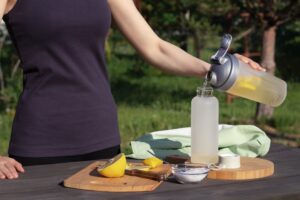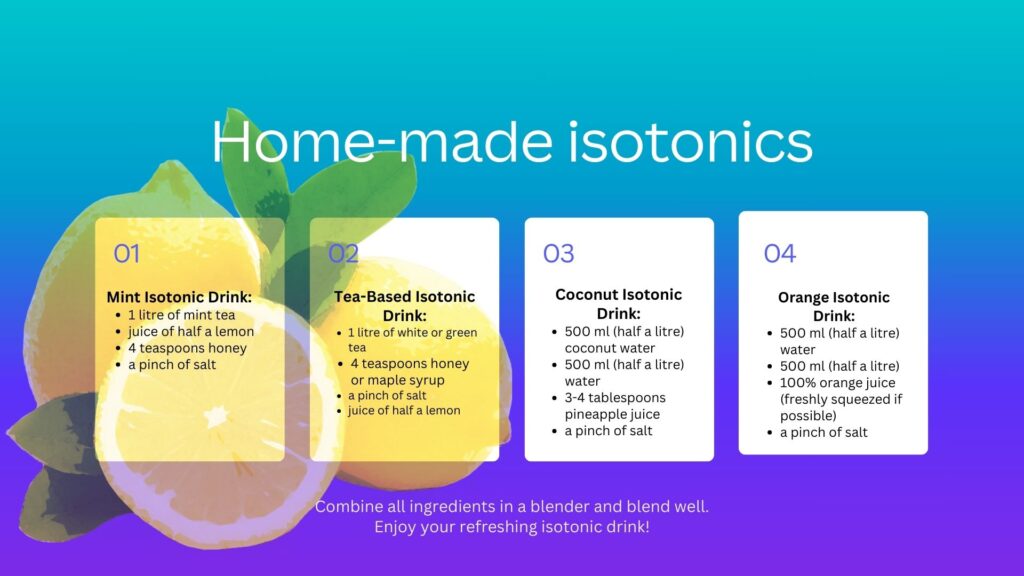 Question: What are isotonic drinks, and when should you use them?
Question: What are isotonic drinks, and when should you use them?
Reply: Isotonic drinks are designed primarily for those engaged in physical activity to help prevent dehydration, replenish electrolytes, and provide carbohydrates during intense exercise. In this article, we’ll explore what isotonic drinks are, their benefits, and who should consider using them.
What Are Isotonic Drinks?
Isotonic drinks, or “isotonics,” are a type of functional beverage formulated to closely match the osmolality (concentration) of bodily fluids. This means they contain a similar amount of particles, like salts and sugars, as your blood, allowing for efficient hydration. Unlike regular water, they also include carbohydrates and electrolytes—minerals like sodium and potassium—that the body loses through sweat during intense activities. Isotonic drinks are available in several forms, including ready-made liquids, powders, and dissolvable tablets. They typically contain 4 to 8 grams of carbohydrates per 100 ml, providing an accessible energy source for athletes.
In addition to isotonic drinks, there are also hypotonic and hypertonic drinks, each suited for different needs:
Hypotonic drinks have a lower osmolality than body fluids and contain fewer carbohydrates (under 4 g per 100 ml). They rehydrate quickly but offer minimal energy.
Hypertonic drinks have a higher osmolality, with more than 8 g of carbohydrates per 100 ml, and are better suited for post-exercise recovery due to their higher energy content.
How Do Isotonic Drinks Work and What Do They Contain?
The primary function of isotonic drinks is to provide rapid hydration. Thanks to their balanced osmolality, they are absorbed quickly, restoring fluids and essential nutrients lost during exercise. Key ingredients typically include:
– Water – the base of the drink, helping with overall hydration.
– Carbohydrates – for energy, often in the form of glucose, fructose, sucrose, or maltodextrin.
– Electrolytes – especially sodium and potassium, which support muscle function and prevent cramps. Some also contain magnesium, calcium, and small amounts of vitamins to enhance performance.
These ingredients combine to hydrate efficiently, provide a steady release of energy, and maintain electrolyte levels, which are essential for sustaining physical performance.
Isotonic Drinks vs. Energy Drinks
It’s important to differentiate isotonic drinks from energy drinks. While both are popular among athletes, they serve different purposes. Energy drinks are designed to increase alertness and reduce fatigue, containing stimulants like caffeine, taurine, and high amounts of sugar. They do not hydrate effectively and, if consumed regularly, may cause dehydration, headaches, and sleep disturbances. Unlike isotonic drinks, energy drinks are not suitable for hydration or electrolyte replenishment during exercise.
Are Isotonic Drinks Healthy?
When used as intended—by those engaging in intense exercise for extended periods—isotonic drinks can be beneficial. They help maintain hydration, energy levels, and electrolyte balance, which are crucial for athletes’ endurance and performance. However, they’re not necessary for everyone. For people doing light to moderate exercise, water is usually sufficient to stay hydrated. Because isotonic drinks contain calories and sugars, people aiming for weight loss should monitor their intake, as these drinks contribute to the overall daily caloric intake.
Who Should Use Isotonic Drinks and When?
Isotonic drinks are recommended for athletes or anyone involved in high-intensity physical activities lasting over an hour. They can be consumed during or after exercise to replenish lost fluids, electrolytes, and energy. Staying hydrated with isotonic drinks during prolonged exercise enhances performance and helps prevent dehydration-related risks, such as dizziness and muscle cramps.
How to Make a Home-made Isotonic Drink

Creating your isotonic drink at home is simple and cost-effective. All you need are a few basic ingredients:
– Water – 500 ml
– Salt – 1/4 teaspoon (to replenish sodium lost through sweat)
– Honey – 2 tablespoons (to provide a source of carbohydrates)
– Lemon or orange juice – 1/4 cup (for natural flavour and additional potassium) – you can easily make it yourself!
Mix all ingredients thoroughly. This homemade drink provides a quick, hydrating source of electrolytes and energy tailored for post-workout recovery.
Isotonic drinks can be an essential addition to an athlete’s regimen, supporting hydration and performance in a way that regular water cannot. Incorporating isotonic drinks can be a beneficial choice if you’re involved in strenuous or prolonged physical activities. Just remember to choose wisely based on your specific needs and to avoid overconsumption if you’re monitoring your calorie intake.
